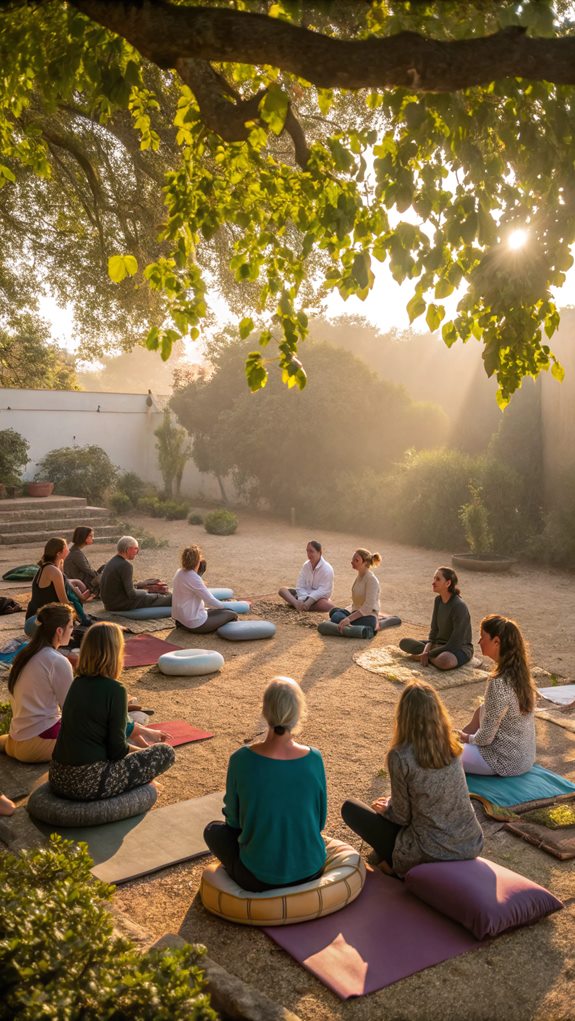To hone mindfulness, think of it as training your brain! Start by practicing breath awareness—just take a seat, breathe in, and focus on that sweet air filling your lungs. Try a body scan to check in with your body from head to toe. You don’t need hours; even 10-20 minutes a day can make a difference. Mix it up! You can try mindful eating or even nature walks. Don’t stress if your mind wanders; that’s part of the game. Stick with it, and you’ll feel calmer and more focused. Curious about more tips and tricks? There’s plenty of good stuff ahead!
Key Takeaways
- Establish a daily mindfulness routine by dedicating 10-20 minutes to practices like breath awareness or body scan meditation.
- Explore various mindfulness techniques, such as mindful eating or nature immersion, to find what resonates with you.
- Utilize resources like mindfulness apps, books, and online courses to enhance your understanding and practice.
- Engage with mindfulness communities through local or virtual meetups to gain support and accountability.
- Accept and observe your thoughts without judgment, allowing for self-awareness and emotional growth during your practice.
Understanding Mindfulness

In today’s fast-paced world, understanding mindfulness is more important than ever. So, what’s mindfulness, you ask? It’s all about paying attention to the present moment without judging yourself or your thoughts and emotions. Imagine stopping for a second to breathe and simply soak in what’s happening around you. Sounds nice, right?
This practice isn’t just a trendy buzzword; it’s rooted in Eastern cultures and helps improve mental health. Mindfulness can reduce stress and anxiety, making life feel a little less chaotic. You might’ve heard of Mindfulness-Based Stress Reduction, a fancy term that basically means learning to chill by being present.
To really get the hang of it, you’ll need to practice mindfulness regularly—kind of like exercising your brain! It takes patience and a sprinkle of trust in the process.
Meditation is a great way to start, allowing you to investigate your thoughts and emotions without judgment. So, grab a comfy spot, breathe deeply, and focus on the now. You’ll be amazed at how much better you can handle life’s curveballs when you accept the present moment!
Benefits of Mindfulness
Practicing mindfulness offers a wealth of benefits that can greatly enhance your well-being. Imagine waving goodbye to stress, anxiety, and depression!
Mindfulness practice has been clinically proven to reduce symptoms of these pesky emotional gremlins, leading to improved mental health. It’s like a superhero for your mind!
As you engage with mindfulness, you’ll find yourself experiencing greater emotional balance. You’ll learn to accept your thoughts instead of wrestling with them, which means fewer negative emotions crashing your party.
Plus, studies show that it can improve your attention span. So, say hello to improved focus and productivity—no more zoning out during meetings!
Better yet, mindfulness can help you get a good night’s sleep. Who doesn’t want to wake up feeling refreshed?
And if that’s not enough, there’s even preliminary research suggesting mindfulness might help with conditions like asthma and fibromyalgia. That’s a win-win!
Key Mindfulness Techniques

Achieving proficiency in mindfulness involves employing specific techniques that can enhance your practice and deepen your experience. Let’s explore some key mindfulness techniques you can start using today!
| Technique | Description | Benefits |
|---|---|---|
| Breath Awareness | Focus on your breathing: inhale for 4, hold for 2, exhale for 4. | Redirects stress and increases relaxation. |
| Body Scan Meditation | Progressively focus on sensations from your toes to your head. | Promotes relaxation and awareness. |
| Mindful Listening | Fully concentrate on the speaker during conversations. | Enhances connections and reduces distractions. |
| Gratitude Journaling | Reflect on positive experiences in a journal. | Shifts focus from negatives to positives. |
| Nature Immersion | Spend time outdoors, engaging your senses. | Amplifies mindfulness benefits! |
Daily Mindfulness Practices
Daily mindfulness practices can alter your routine, making it easier to stay grounded amidst life’s chaos. You don’t need to be a monk to practice mindfulness; just a few minutes each day can do wonders for your mind and body!
Here are three simple daily mindfulness practices you can start right away:
- Deep Breathing Exercises: Take a few moments to focus on your breath. Inhale deeply, hold for a second, and exhale slowly. This helps redirect your attention from negative thoughts to the present moment, giving your mind a mini-vacation.
- Body Scan Meditation: Find a comfy spot, close your eyes, and focus on different parts of your body. Start from your toes and work your way up. This promotes awareness of physical sensations and aids in relaxation. You’ll be amazed at how much you notice!
- Mindful Eating: Next time you eat, savor each bite. Pay attention to the flavors and textures. This practice not only enhances your appreciation for food but also helps with better digestion.
Incorporating these practices into your daily routine can lead to greater awareness and emotional resilience.
Give it a try, and watch your life shift!
The Science of Mindfulness

Mindfulness isn’t just a buzzword; it’s backed by science that reveals its significant impact on our brains and well-being. Think of mindfulness as a workout for your brain. Research shows that practicing mindfulness can actually reshape your brain. It enhances areas linked to emotional regulation and cognitive flexibility. So, if you want to tackle anxiety and depression, mindfulness might just be your new best friend!
Jon Kabat-Zinn, the mindfulness guru, defines it as purposefully paying attention to the present moment. It’s all about non-judgmental awareness—no harsh self-talk allowed! Studies show that mindfulness can improve your mental health, making you more resilient to stress. You’ll find yourself handling tough situations with a cool head.
Plus, regular mindfulness practice increases gray matter in areas tied to self-awareness and compassion. Imagine being more compassionate, not just to others but to yourself! It can even help you avoid burnout at work, making you a superstar in your job.
Addressing Common Misconceptions
When it comes to mindfulness, many misconceptions can cloud its true essence. Let’s clear the air so you can better serve yourself and others. Here are three common myths:
- Mindfulness means no thoughts: Nope! It’s about noticing your thoughts, accepting them, and letting them float by without judgment. You’re not trying to erase your mind; you’re simply observing.
- You need hours to practice: Not true! Even a few minutes of mindfulness meditation can enhance your mental health. Just a quick check-in with your breath during your daily routine can work wonders.
- Mindfulness is just for relaxation: While it helps you chill out, it’s also a powerful tool for developing a Growth Mindset. It enhances self-awareness and helps you respond to stress more effectively.
Also, remember, you don’t have to sit in silence to practice mindfulness. You can be mindful while walking or even enjoying a meal!
Accept your physical sensations and connect with the moment. So, let go of these misconceptions, and immerse yourself in the real magic of practicing mindfulness!
Creating a Mindfulness Routine

As you commence on your mindfulness expedition, establishing a routine can considerably enhance your practice. Think of it as your daily dose of mental health vitamins.
First, find a quiet place where distractions are like a bad date—you just want them to leave! Once you’re settled, take a moment to notice how your body feels. Is your back protesting? Is your mind racing? That’s okay!
Next, start creating a mindfulness routine. Aim for at least 10-20 minutes each day. You might begin with short sessions, gradually increasing as you get comfy.
Take a deep breath and immerse yourself in various techniques. Try breathing exercises, body scans, or even mindful walking. Keep it fresh—like switching up your favorite playlist!
Resources for Mindfulness Practice
Finding the right resources can greatly enhance your mindfulness practice. When you’re trying to elevate your mental health and well-being, it helps to have some trusted tools in your back pocket.
Here are three gems to check out:
- Mayo Clinic: This place offers a wealth of guided exercises and health tips. Don’t forget to subscribe to their newsletter for the latest on mindfulness and wellness! You’ll notice how much easier it’s to stay informed.
- Books by Jon Kabat-Zinn: His best-sellers on mindfulness and meditation practices are like a warm hug for your brain. They make complex ideas simple and relatable, helping you deepen your understanding.
- Mayo Clinic Press: Their books focus on health improvement, bringing mindfulness straight to your bookshelf. You’ll be well-equipped to serve not just yourself, but others too!
Mindfulness isn’t a solo expedition. Use these resources to support your practice and help those around you.
Engaging With Mindfulness Communities

Engaging with mindfulness communities can greatly enhance your practice and provide a sense of belonging that raises your motivation. Think of it as finding your tribe! When you connect with others who share your passion for mental health and mindfulness, you’ll feel supported and encouraged.
Group settings can make your practice a lot more enjoyable and consistent. Join a local meetup or hop online to find virtual groups. You’ll uncover plenty of resources like guided meditations and workshops that teach beneficial techniques.
These communities often organize fun events, like retreats, where you can delve deeper into your practice. Plus, you get to learn from different viewpoints—who knew you could pick up so much wisdom from a fellow mindful enthusiast?
Participating in group meditations can enhance your accountability, making it easier to stick to your routine. And let’s be honest, sometimes it’s just nice to share a laugh or two over the struggles of keeping your mind focused.
Share On X
Conclusion
So, you’ve learned how to excel in mindfulness—congratulations! Now, just remember, it’s not about sitting on a mountaintop in silence; it’s about being present, even when your cat decides to knock over your coffee. Welcome the chaos, breathe through the madness, and laugh at your own thoughts. With a little practice, you’ll be a mindfulness ninja in no time! Just don’t forget to enjoy the expedition—because, let’s face it, life isn’t always calm and peaceful!
Join our list
Subscribe to our mailing list and get interesting stuff and updates to your email inbox.

